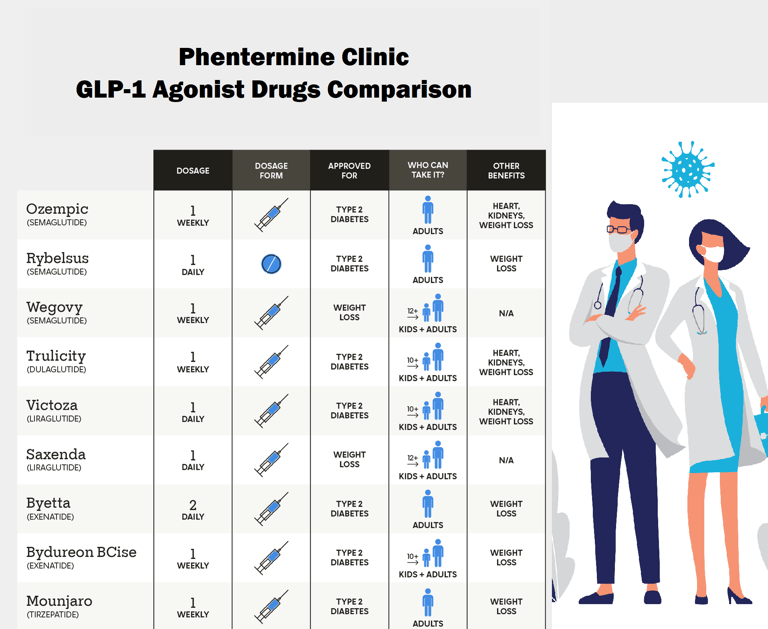The Comprehensive Guide to GLP-1 Medication for Weight Loss: What You Need to Know
Introduction
In recent years, the fight against obesity has seen a significant breakthrough with the introduction of GLP-1 (glucagon-like peptide-1) medications. These drugs have shown great promise in helping individuals lose weight effectively and sustainably. If you're considering GLP-1 medication as part of your weight loss journey, this comprehensive guide will provide you with all the information you need to make an informed decision.
What is GLP-1?
Understanding GLP-1
GLP-1 is a hormone naturally produced in the intestines in response to food intake. It plays several crucial roles in the body, including:
Regulating Blood Sugar Levels: GLP-1 stimulates the release of insulin and inhibits the secretion of glucagon, both of which are essential for maintaining blood sugar levels.
Suppressing Appetite: GLP-1 slows gastric emptying and promotes a feeling of fullness, reducing overall food intake.
Enhancing Heart Health: GLP-1 has been shown to have protective effects on the cardiovascular system.
The Role of GLP-1 in Weight Loss
The appetite-suppressing and blood sugar-regulating properties of GLP-1 make it an attractive target for weight loss treatments. By mimicking the effects of this hormone, GLP-1 medications can help individuals reduce their calorie intake and lose weight more effectively.
GLP-1 Medications: An Overview
Types of GLP-1 Medications
Several GLP-1 receptor agonists are currently approved for weight loss and diabetes management. Some of the most common ones include:
Liraglutide (Saxenda, Victoza): Originally approved for type 2 diabetes, liraglutide has shown significant weight loss benefits and is marketed as Saxenda for obesity treatment.
Semaglutide (Ozempic, Wegovy): This medication has gained popularity due to its impressive weight loss results. Wegovy is the higher-dose version specifically approved for obesity.
Dulaglutide (Trulicity): Another GLP-1 agonist used for diabetes, with potential off-label use for weight loss.
How GLP-1 Medications Work
GLP-1 medications mimic the action of the natural hormone, binding to GLP-1 receptors in the body. This leads to:
Increased Insulin Secretion: Helps control blood sugar levels, preventing spikes and crashes.
Delayed Gastric Emptying: Slows down the digestive process, leading to prolonged feelings of fullness.
Reduced Appetite: Directly acts on the brain to suppress hunger signals.
Benefits of GLP-1 Medications for Weight Loss
Significant Weight Loss
Clinical trials have demonstrated that GLP-1 medications can lead to substantial weight loss. On average, individuals taking these medications can expect to lose between 5% to 15% of their initial body weight, depending on the specific drug and dosage.
Improved Metabolic Health
Beyond weight loss, GLP-1 medications offer several metabolic benefits, including:
Better Blood Sugar Control: Essential for individuals with type 2 diabetes or prediabetes.
Reduced Cardiovascular Risk: Improved heart health markers, such as lower blood pressure and cholesterol levels.
Enhanced Insulin Sensitivity: Helps the body use insulin more effectively, reducing the risk of diabetes.
Long-term Sustainability
One of the key advantages of GLP-1 medications is their potential for long-term weight management. Unlike many fad diets and quick fixes, these medications support sustainable weight loss by addressing the underlying hormonal and metabolic factors.
Potential Side Effects and Risks
Common Side Effects
Like any medication, GLP-1 drugs can cause side effects. The most common ones include:
Nausea: Often occurs when starting the medication but tends to diminish over time.
Diarrhea or Constipation: Gastrointestinal issues can arise but are usually manageable.
Headaches: Some individuals may experience mild headaches.
Serious Risks
While rare, there are potential serious risks associated with GLP-1 medications:
Pancreatitis: Inflammation of the pancreas, which requires immediate medical attention.
Gallbladder Issues: Such as gallstones or cholecystitis.
Kidney Problems: Although uncommon, some users may experience kidney-related side effects.
Who Should Avoid GLP-1 Medications?
GLP-1 medications may not be suitable for everyone. Individuals with the following conditions should consult their healthcare provider before starting treatment:
History of Pancreatitis: Due to the risk of recurrent episodes.
Severe Gastrointestinal Disease: Such as gastroparesis.
Medullary Thyroid Carcinoma or Multiple Endocrine Neoplasia Syndrome Type 2: These conditions are contraindications for GLP-1 medications.
Getting Started with GLP-1 Medication
Consultation with a Healthcare Provider
Before starting any weight loss medication, it's crucial to consult with a healthcare provider. They will assess your medical history, current health status, and weight loss goals to determine if GLP-1 medication is appropriate for you.
Prescription and Dosage
If GLP-1 medication is deemed suitable, your healthcare provider will prescribe the appropriate drug and dosage. It's important to follow their instructions carefully and attend regular check-ups to monitor your progress and adjust the treatment as needed.
Lifestyle Modifications
While GLP-1 medications can significantly aid weight loss, they work best when combined with lifestyle changes. These include:
Healthy Eating: Focus on a balanced diet rich in whole foods, vegetables, lean proteins, and healthy fats.
Regular Exercise: Aim for at least 150 minutes of moderate-intensity exercise per week.
Behavioral Therapy: Consider working with a therapist or counselor to address emotional and psychological factors related to eating and weight.
Real-life Success Stories
Case Study 1: John's Journey to a Healthier Life
John, a 45-year-old man with a BMI of 35, struggled with obesity for most of his adult life. After numerous failed attempts with diets and exercise alone, his doctor recommended GLP-1 medication. Within six months, John lost 12% of his body weight, improved his blood sugar levels, and felt more energetic than ever.
Case Study 2: Maria's Transformation
Maria, a 35-year-old woman with type 2 diabetes, was prescribed liraglutide to help manage her blood sugar. Not only did she achieve better glucose control, but she also lost 10% of her body weight over a year. This significant weight loss improved her overall health and reduced her need for additional diabetes medications.
Conclusion
GLP-1 medications represent a promising advancement in the field of weight loss and metabolic health. By leveraging the body's natural hormones, these drugs can help individuals achieve and maintain significant weight loss, improve their metabolic profile, and enhance their overall quality of life. However, it's essential to approach GLP-1 medication as part of a comprehensive weight loss plan, including lifestyle changes and regular medical supervision.
If you're considering GLP-1 medication for weight loss, consult with a healthcare provider to determine the best course of action for your individual needs. With the right support and commitment, GLP-1 medication could be the key to unlocking your weight loss success and achieving a healthier, happier life.


